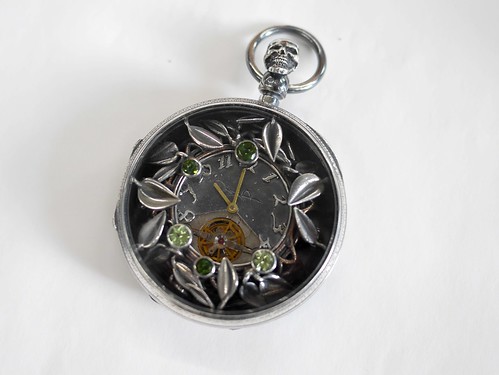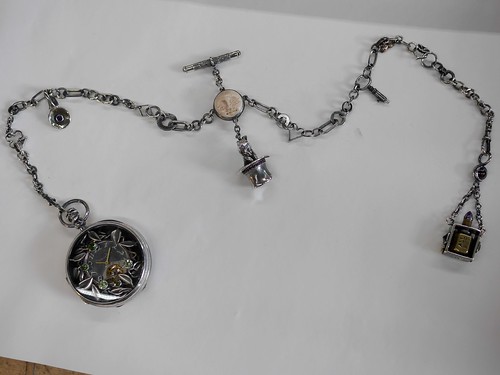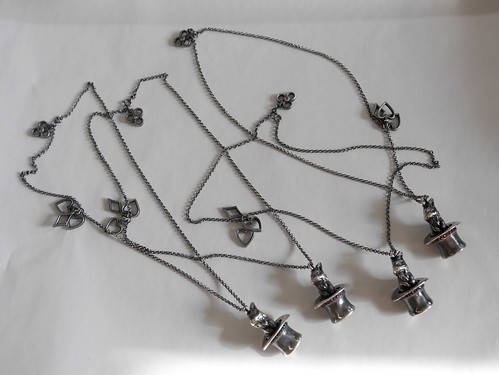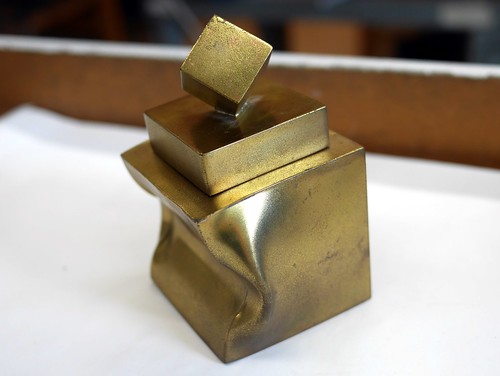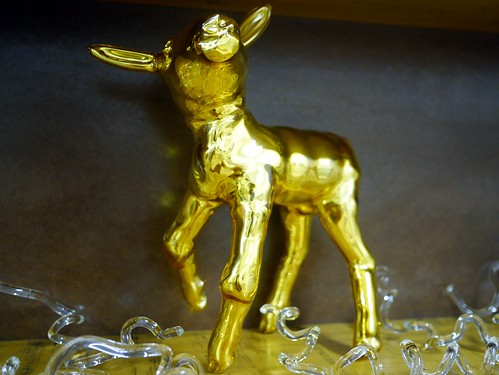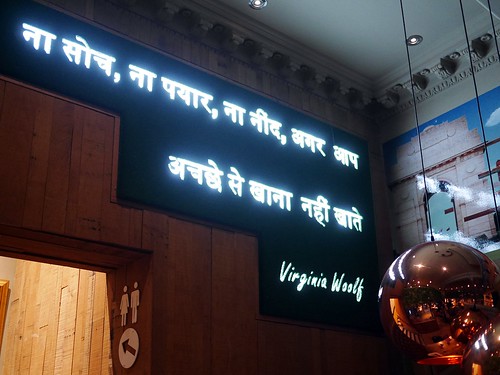After this arrived back from the fitting, it was just a question of dropping the movement into the case and polishing the chain and fob.
Some of you may recall that part of the exhibition involved the production of a set of smaller, more commercial pieces which relate to the main exhibit and I have also been working on my "Rabbit in Hat" pendants. These were also finished this week:
There will not be much more from me over the next week as it is final-year hand-in time for the degree students and I am going to be locked away marking but it is nearly that time of year again for the reviews of the Scottish jewellery degree shows, kicking off with Dundee's in ten days' time.
One of the students caused me to dig out an old piece this week, a brass tea-caddy that I made almost 15 years ago. It was very pleasing to know that they still couldn't work out how I'd done it!
On Saturday night, I hooked up with my friend, Carrie Fertig, for a party to celebrate the opening of her new studio in Edinburgh. You may recall Carrie from a previous post about her work for a show in Perth in 2011. Her new studio is a fantastic space very near to the centre of Edinburgh and already full of her brilliant work, including this:
Although you might not guess it, this is a musical instrument and make the most glorious noise. Carrie has been working a lot with music and sound recently, collaborating with dancers and composers and making thrilling musical instruments which reflect her own interests and history. You can see several videos of her work on Vimeo, well worth having a look.
For long enough there has been a page in one of my notebooks with two words written on it in very large letters: ADA LOVELACE. If you have never heard the name before, I would hardly be surprised but society in general should be ashamed of the fact that Charles Babbage's right-hand man was, in fact, a woman, the sublimely eccentric Ada Lovelace. Everyone knows that Babbage created the first computer and that it was his thinking and engineering skills which led to the computers which we have today but what almost nobody realises is that it was Ada Lovelace (correctly Augusta Ada King, Countess of Lovelace) who wrote the first 'computer programme', the very first machine-readable algorithm.
Ada Lovelace was a remarkable character in so many ways, starting with the fact that she was Lord Byron's daughter. Her interest in mathematics came from her mother's determination that her daughter should not follow her detested father into poetry and insanity! Well, it seems to have worked and Ada Lovelace was one of the truly great minds of the 19th Century, up there with Babbage, Faraday, Dickens and Brunel, all of whom she knew.
I've been a fan ever since I read about her many years ago and have wanted to make a piece of jewellery about her as part of a series of biographical works for which I've made notes but almost no progress (this series includes the Alexander McQueen pieces from last year and there are notes on a piece for John Cage and one for Alan Turing).
The Ada Lovelace piece could come a step nearer now that I've discovered this remarkable book:
"The Thrilling Adventures Of Lovelace And Babbage" by Sydney Padua, a book which blends fact and fiction so cleverly and inventively that it is possible to get lost in the uproarious narratives without even realising that you are learning loads about all the (real-world) characters without ever confusing the truth with the fantasy for one moment. The book is obsessive, rather as a devotion must be - this is definitely the work of a woman on a mission! - and the author/artist intrudes herself into the narratives with exclamations of pride and joy at her own researches and discoveries in a manner which never seems vain or objectionable but which adds reality and humanity to the work. As someone who loves footnotes, endnotes, marginal notes and even footnotes on endnotes, this is a sprawling, complex pleasure of the first order, especially as many of my own heroes of the 19th Century appear in bit-parts.
Finally, I went out for dinner with my friend, Janine this week. We decided that we wanted curry and went to a fairly recent addition to the Glasgow restaurant scene, Usha's, a vegetarian pan-Indian restaurant which deals in lesser-known Indian foods. The food was excellent and we were both tickled by this quotation from Virginia Woolf, offered in Hindi with no translation (even though we both guessed it).
"One cannot think well, love well, sleep well, if one has not dined well."


